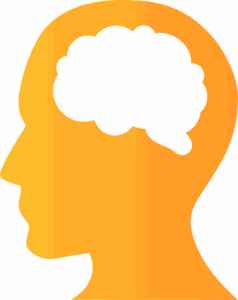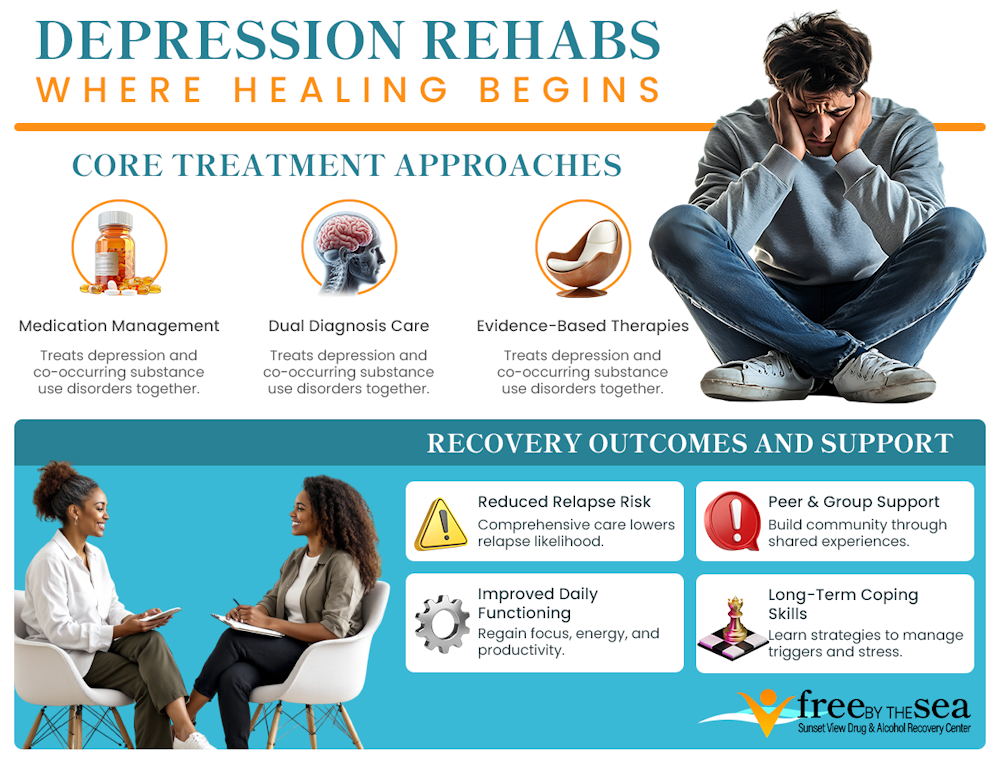Often, individuals who suffer from addiction also have mental health disorders. So, it is not uncommon for an individual to suffer from depression and substance abuse at the same time. Thankfully, dual diagnosis treatment can help those who are living with co-occurring substance abuse and mental health conditions.
Our experienced staff at Free by the Sea, located in the State of Washington, addresses the conditions of both depression and addiction. Our addiction treatment professionals understand the methods that are necessary for effectively treating dual diagnoses. We provide solutions using state-of-the-art testing, therapy, medications, and a relationship built upon trust and constant communication between the patient and staff.
What is Depression?

Depression is a mood disorder that is typified by feelings of emotions such as hopelessness, fatigue, sadness, and a lack of enthusiasm in activities that the sufferer formerly enjoyed.
Since depression can impact every area of a person’s life, it is regarded as a very serious mental health disorder. Mood disorders such as depression can be life-altering and difficult to manage. Fortunately, however, depression is treatable. Treatment programs can offer individuals the opportunity to enjoy a healthier, happier life that is more stable and productive.
Common Symptoms of Depression
Some of the depression symptoms that commonly occur in the lives of those suffering from this mental health disorder include:
- Sleeping too much or not enough
- Loss of interest in activities that were once enjoyable
- Dietary changes — eating less than or more than usual
- Loss of energy — listlessness or extreme fatigue
- Problems concentrating or mental confusion
- The feeling of being “stuck in a rut”
- Feelings of worthlessness
- Depressive episodes
- Suicidal impulses
Everyone is unique; not everyone who struggles with depression will exhibit all of these symptoms of depression. Still, individuals who are showing any depressive symptoms should seek the help of a professional immediately.
With assistance from individuals who treat psychiatric disorders, people struggling with clinical depression can begin to manage their symptoms and address underlying issues.
Types of Depression
The symptoms of depression depend on the type of disorder a person has. There are several types of depression and they can affect people in various ways. Some of the types of depression include the following:
- Major Depression (Major Depressive Disorder): This mental illness is characterized by symptoms such as changes in weight, tiredness and lack of energy, suicidal ideation, difficulty with concentrating, challenges with decision-making, restlessness, agitation, sluggishness, and sleeping problems.
- Seasonal Affective Disorder (SAD): Individuals who suffer from seasonal affective disorder experience the symptoms of this disorder when seasons change. Many people encounter symptoms during winter and fall.
- Postpartum Depression: Postpartum depression is characterized by feelings of sadness, anxiety, and exhaustion. Many women experience this type of depression after giving birth.
- Persistent Depressive Disorder: This disorder was once known as “dysthymia”. It is characterized by a chronic, continual depressed mood. Some of the symptoms of this mood disorder include social withdrawal, irritability, feelings of dispair and hopelessness, memory problems, and difficulty concentrating.
- Psychotic Depression: This type of depression is a type of major depression. Those who have this disorder experience symptoms of psychosis, including hallucinations, paranoia, delusions, and difficulty deciphering what is reality and what is not real.
Mental disorders can be challenging to address. But, with assistance from a professional treatment provider, individuals can develop a plan to manage their symptoms.
What is Substance Abuse?
Substance abuse, also known as “addiction,” is a disorder that is characterized by drug or alcohol misuse. Individuals who suffer from substance abuse use alcohol or drugs outside of their intended use. Or, they use illicit drugs that are not safe to use.
Some of the common types of addiction include:
People who suffer from illicit drug misuse use substances like heroin or cocaine. They may inject drugs into their bodies or snort drugs that are in powered forms. Individuals who struggle with alcohol addiction may use alcohol more often than is safe. They might drink alcohol first thing in the morning or use it to help them sleep at night. Alcoholism may also show itself in a person’s inability to control how much or how often he or she drinks.
Prescription drug abuse can occur in the lives of people who use medication to treat chronic pain, mental illness, physical sickness, and more. Or, individuals who do not have a prescription for these medications may use other people’s pills to get ‘high’ or become alert. When a person struggles with prescription drug abuse, he or she may use medications more often or in higher doses than their doctor recommends.
Substance use disorder can affect anyone. This includes older adults, young people, men, women, and people from all walks of life. Addiction comes in many forms and affects people in many different ways. This is why addiction treatment services and programs are so important. This is especially the case when one considers the fact that addiction doesn’t always occur alone. Sometimes, mental illness accompanies substance use disorder.
How Depression and Substance Abuse Connect
 Many times, people who suffer from depression will receive treatment that involves medication. These medications can, indeed, be helpful in managing the effects of depression. However, some individuals become dependent on these prescriptions. They might begin taking more that the prescribed amount. Or, they may begin “doctor shopping”, visiting more than one medical professional in an effort to receive more medication than they are supposed to have.
Many times, people who suffer from depression will receive treatment that involves medication. These medications can, indeed, be helpful in managing the effects of depression. However, some individuals become dependent on these prescriptions. They might begin taking more that the prescribed amount. Or, they may begin “doctor shopping”, visiting more than one medical professional in an effort to receive more medication than they are supposed to have.
Others may try to self-medicate using alcohol or drugs. They may try to ease their emotional pain by resorting to substance use. While these substances may provide temporary relief, their effects can wear off, leaving behind a serious problem: addiction.
On the other hand, some people may develop symptoms of depression as a result of their struggle with addiction. Social isolation, family problems, financial trouble, job loss, and so many more issues often occur when addiction develops in a person’s life. Depression can occur as a result.
When it comes to having substance abuse and depression, it is important to realize that it does not matter which came first. It is more important to understand the necessity of finding a dual diagnosis treatment provider. When individuals suffer from alcohol and drug abuse in addition to a mental disorder, finding the right kind of help is invaluable. So, if you are struggling with depression and substance abuse, now is the time to begin seeking treatment.
Link Between Alcohol Abuse and Depression
Many people drink alcohol at social events and perhaps with their dinner. But, others find it difficult to control their drinking. They may consume alcohol in an effort to block physical pain. Or, they may drink alcoholic beverages to combat stress or fight anxiety. Individuals who suffer from symptoms of depression may also drink excessively.
But fighting symptoms of depression with alcohol can be harmful. Since alcohol is a depressant substance, any relief that comes through drinking is quickly reversed and is likely to intensify the depression.
Binge drinking — defined as ingesting large amounts of alcohol in a short time span — often leads to the development of depression. Young people with pre-existing depression are more likely than others to suffer from alcohol abuse.
Binge drinking often leads to the development of depression. More and more evidence shows that when underlying depression symptoms are left untreated, the individuals often turn to alcohol.
Link Between Drug Addiction and Depression
Drug use can lead to the development of depression. When a person suffers from cocaine abuse, heroin addiction, prescription drug misuse, or any other type of substance use disorder, the effects are usually more than physical. While drug addiction causes physical consequences, it can also cause emotional disturbances and mental health challenges.
Also, depression can cause individuals to resort to drug use. They may begin using drugs in order to cope with the negative emotions they feel. Some individuals may use a particular substance in order to become “high” or to block the pain they feel.
Those who are suffering from depression may have an increased risk of developing co-occurring addiction. On the other hand, people who suffer from substance use disorders may have an increased risk of developing clinical depression or other co-occurring disorders.

Depression and Addiction Treatment at Free by the Sea
When it comes to treatment options available for your addiction, Free by the Sea has you covered. There are many treatment programs available to fit your individualized recovery needs. Some of these treatment options include the following:
- Inpatient Treatment
- Outpatient Treatment
- Detox
- Therapy
Detoxification
One of the most difficult parts about coming off of drugs is having to deal with the symptoms of withdrawal. Vomiting, headaches, and depression just don’t seem worth it in the midst of the journey. But there are ways to curb those symptoms, and that is with medically assisted treatment.
Medically assisted treatment (MAT) is designed to treat withdrawal symptoms while weaning patients off of drug or alcohol dependency. This way, patients can come off of drugs more comfortably.
While we do not offer detox services here at Free by the Sea, we can help our clients find the right detox facility through our referral services.
Residential Treatment
Otherwise known as inpatient treatment, residential care lasts anywhere between 28 days to six months. It is meant for those who suffer from severe cases of addiction. Also, it can be effective for those who are suffering from co-occurring addiction and mental health challenges. Those who participate are given 24-hour access to our professionally trained medical staff, as well as weekly (sometimes daily) access to professional therapists and psychiatrists.
Outpatient Treatment
Outpatient treatment is meant for those who have either completed residential treatment or for those who only suffer from mild addiction. This method of care usually lasts anywhere from 3 months to over a year and provides patients with somewhere between 10-12 hours of weekly access to professional therapists and psychiatrists. For those who want to seek treatment that provides minimal disruption to their daily lives, outpatient rehab in Washington is the best choice for their individual care needs.
Therapy
There are many different kinds of therapy, some of which are listed below:
- Individual Therapy
- Group Therapy
- Family Therapy
- Cognitive Behavioral Therapy
- Dialectical Behavioral Therapy
Through counseling, individuals can discover and address the underlying factors and causes of substance abuse and depression in their lives. Instead of choosing to self-medicate by turning to alcohol or drugs, they can become more confident in substance-free solutions and coping methods.
Therapy can help provide support for those who are going through recovery. It can also help people develop relapse prevention skills. Those who suffer from depression and addiction can heal through individual and group therapy.
Let Free by the Sea Help You Today!

At Free by the Sea, we take addiction and mental illness seriously. So, if you are dealing with depression and substance abuse, we are here to help you! Through our treatment services, we will equip you with the tools you need to remain free from addiction. We’ll also strive to help you manage your co-occurring depression.
Our philosophy here is that no one person is the same as another individual, and treatment should reflect that. At Free by the Sea in Washington, our professionally trained medical staff work to meet the unique needs of those who are suffering from a dual diagnosis. This has the potential to lead someone to a happier, more stable state of being. So, if you’re ready to overcome addiction and depression in your life, please contact us today!

Dr. Richard Crabbe joined our team in 2019 as our psychiatrist and medical director. He attended the University of Ghana Medical School where he became a Medical Doctor in 1977. From 1978 through 1984, he was a medical officer in the Ghana Navy and provided a variety of services from general medicine to surgeries. He received his Certificate in General Psychology from the American Board of Psychology and Neurology in 2002.
Insurances We Accept
Free by the Sea recognizes the importance of having insurance to receive addiction treatment. Let us work with you to provide you or a loved one with premier addiction treatment services. We accept several private insurance plans. Verify your rehab coverage with us today to ensure you receive the support that you need! Find out if you are covered today!











